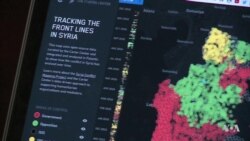Many reporters have been killed in Syria. Others have been forced to leave the country -- or frightened into doing so. But believable information can still be gathered about what is happening there. A worker at the Carter Center in Atlanta, Georgia recently discovered how.
Christopher McNaboe is the manager of the Syria Conflict Mapping Project at the center. He says he discovered that many people in Syria use the internet.
“Syrians -- and actually people in the Middle East in general -- are two to four times as likely to share information about politics and religious views online.”
Before he became the manager of the project, McNaboe was an intern at the Carter Center. He says he discovered that the conflict in Syria was different than others.
“There are actually more minutes of video than of real time conflict. The Syrian conflict represents a major paradigm shift in the way in which conflict plays out -- previous conflicts did not take place in connected environments like Syria.”
McNaboe discovered he could use Facebook, YouTube and Twitter to gather information on where fighters were in the country, who they were fighting for and who was joining them. He was able to document the formation of more than 7,000 opposition armed groups in the country. Some of the groups are no longer active.
“In the case of Syria, there’s just too much -- videos, Facebook posts, tweets, blogs, photos, you name it. Syrians are very active about getting information out,” he said. “One of the first things we started seeing online was the announcement of defections. As the conflict turned violent, people started defecting from the Syrian security forces. And they did so online.”
McNaboe now works full-time to map the war in Syria. He shares his information with mediators and humanitarian groups to help them understand the conflict.
“The information available online ranges anywhere from political statements, and defections, and armed group formations, to footage of the actual fighting, and humanitarian relief efforts -- you name it,” says McNaboe.
Former President Jimmy Carter told VOA the information can help aid groups.
“So when the United Nations needs to find the, the best avenue to take in relief supplies, we can tell them which way to go.”
The Carter Center publishes some of its maps and reports about Syria. They are used by reporters, non-profit groups and governments. Carter says he gave some information to President Vladimir Putin when Russian forces entered Syria in 2015.
“When he got ready to join in, and, and bomb, factions within Syria, I wanted to make sure he'd bomb the right ones -- or at least he knew what he was bombing. So I sent him a, a message through his embassy and said 'we have this capability within Syria to tell you where things are, people are located. Do you want to have that?’ And so the next day I got a response from him ‘Yes, I would like to have your maps.’ So we sent our maps, on, on a current basis, to President Putin so when he bombs in Syria, he knows from us where the different people in Syria are located.”
McNaboe says the Carter Center wanted Russia to know that the center could watch their targets in Syria.
Some observers are worried that some military forces will use the center’s maps and reports. But McNaboe says the center does not share information that puts people at risk.
“If you're a combatant in the conflict and you don’t know where the front lines are, our information is, is not gonna help you too much. You’ve got bigger problems. And, and so we're, we're careful of what we make totally public. We, we want our effort to pursue peace and support peace efforts, and do everything it can to reduce the risk to civilians and, and any participant in the conflict.”
I’m John Smith.
VOA Correspondent Kane Farabaugh reported this story from Atlanta. John Smith adapted his story for Learning English. Kelly Jean Kelly was the editor.
We want to hear from you. Write to us in the Comments Section, or visit our Facebook page.
________________________________________________________________
Words in This Story
intern – n. a student or recent graduate who works for a period of time at a job in order to get experience
real time – adj. happening or shown at the speed at which a computer receives and processes information
paradigm – n. a model or pattern for something that may be copied; a theory or a group of ideas about how something should be done, made, or thought about
connected environments – expression places where people have access to the internet
document – v. to create a record of (something) through writing, film, photography, etc.
defect – v. to leave a country, political party, organization, etc., and go to a different one that is a competitor or an enemy
mediator – n. someone who works with opposing sides in an argument or dispute in order to get an agreement
footage – n. scenes or action recorded on film or video
relief – n. things (such as food, money, or medicine) that are given to help people who are victims of a war, earthquake, flood, etc.
faction – n. a group within a larger group that has different ideas and opinions than the rest of the group
capability – n. the ability to do something
basis – n. a fixed pattern or system for doing something (used with “on”)
combatant – n. a person, group or country that fights in a war or battle
front lines – n. an area where soldiers are fighting
pursue – v. to make an effort to find out more about (something)








